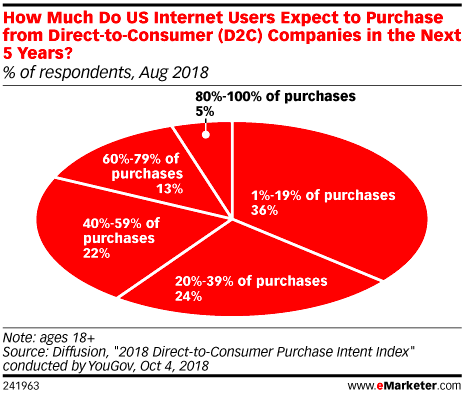
Why Direct-to-Consumer is the Future
What do Warby Parker, Plated, and Casper (the mattress company, not the friendly ghost) have in common? All three have utilized a direct-to-consumer model of engagement to achieve global recognition and success.
Direct-to-consumer (D2C) is the future of consumer engagement, so let’s define it. Direct-to-consumer is when customers buy directly from a brand without any middlemen or third-parties. In the vast majority of cases, this is achieved through the brand’s online portal, where the company is solely responsible for the brands’ shipping, messaging, pricing, and customer service. This, of course, takes a lot of work, a clear understanding of your customers, and a lot of planning (usually centered around data).

The aforementioned direct-to-consumer brands have taken on their respective industries, and are standing tall. As traditional retailers struggle to acquire and retain customers, 2019 is the year we predict many will begin tackling the challenges they face, adjusting to the times, and looking to the D2C model for inspiration. And it makes sense. According to a recent eMarketer survey, 100% of respondents expect at least some of their purchases over the next five years to be from D2C brands.
So, what exactly has led to the success of D2C? It’s all about control. As Scott Ginsberg aptly remarks on bigcommerce.com, brands “don’t want to rely solely on the stores to put the products out in the right places for the right people, or for the local sales reps to be educated about it. The other upside is, that brands who go direct to consumer take ownership over their most important assets: Their customers.”
Customers want a simple, hassle-free experience, and direct-to-consumer brands are in a unique position to offer just that — even among online retailers. Of course, buying from home, in your pajamas, is a modern convenience that we can all get behind, but even purchasing with online middle-men like Amazon has its share of frustrations, such as researching through a deluge of competing products, and racking your brain for the correct search word for what you are looking for. Direct-to-consumer brands are specific in what they sell. For example, Warby Parker sells glasses. Casper sells mattresses. D2C brands rely on this specificity and brand message to make customer purchases as simple and effortless as possible.
There are other benefits as well. Companies cut costs by bypassing third-parties fees and profit-sharing altogether. Expenses can be further cut by needing less inventory, less space, and having better control over the shipping process. Companies that pass that savings onto their customers gain sales, and more importantly, have an amazing opportunity for further brand loyalty. And brand loyalty is the name of the game.
Direct-to-consumer brands interact with their customers every step of the way, from searching to buying to shipping (to possibly returning), and if the experience goes well, the brand reaps the reward for their efforts, either through repeat customers, positive word of mouth (especially through social media), or simply having a direct relationship for further marketing opportunities.
As Caroline Forsey of HubSpot states, “The benefits of D2C marketing are clear: through this direct relationship, these companies are creating strong relationships between consumers and their brand, understanding their consumers better, and reaching a more specific, appropriate audience.” As an added bonus, even the data gathered comes directly from the consumer/brand interaction, meaning that the information is always relevant and proprietary. D2C brands will know when and how to connect with their audience, and what messaging works best.
So, how can more traditional businesses adjust to the times? If they can, expect some companies to jump completely in the direct-to-consumer market. Having the right people and systems in place is paramount for this to work. The marketing team must reach out to their desired customers in fun, engaging, and applicable ways.
The customer service team must be knowledgeable, polite, and helpful — essentially, willing to go above and beyond to make customers feel valued and prevent frustration. The layout of the online store needs to make the browsing and purchasing process as clear and easy as possible, and the shipping process needs to be streamlined and fast.
Josh Hix, the co-founder, and CEO of Plated, a successful D2C meal kit business does an excellent job of outlining the issues and strategies for starting this form of consumer interaction here. Additionally, Hix explains that D2C doesn’t have to be exclusively online; It’s about finding a balance of presenting your brand in a way that works for your customers:
Retail stores can also serve as miniature warehouses of sorts, making your delivery to customers faster when they do order online. They can also serve as pickup points for the “click and collect” customer.
Most importantly, direct-to-consumer companies need to find what makes their unique selling proposition — the ways in which their brand is differentiated from other brands — be it originality, quality, prices, or brand philosophy.
There are other companies that cannot or will not enter the direct-to-consumer market — but that does not mean that they cannot learn from it. Ad Age predicts larger companies “will dabble in more innovative marketing experimentation” and will look to “acquire existing D2C brands.” They also suggest that larger companies must rely less on third-party data, and more on building their own using tools that improve the quality and depth of first-party data (like Lineate’s data orchestration solutions).
One thing is certain — the direct-to-consumer era is here, and consumer businesses need to take notice or run the risk of being taken down. Get started on creating the data you need to understand consumers and give them more personalized experiences now by reaching out to our SA team for a free evaluation.
Share:
Got a project?
Harness the power of your data with the help of our tailored data-centric expertise.
Contact us